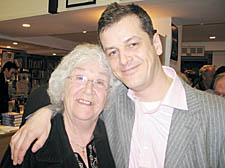|
|
 |
| |

Dame Shirley Porter

Andrew Hosken |
Dame Shirley and the subversion of democracy
Missing millions, shady characters and dodgy offshore investments. Welcome to the world of Dame Shirley Porter, writes Illtyd Harrington
Nothing Like A Dame – The Scandals of Shirley Porter
by Andrew Hosken
Granta Books, £20
WE all have good and bad years but 1991 was the beginning of
the end for one of the more grotesque of one of London’s
political fraudsters. In the New Year’s honours list PM
John Major made Shirley Porter – the over, but in reality
under, exposed leader of Westminster City Council – a Dame
of the British Empire.
Under increasing public scrutiny she gracefully laid aside her
leadership burden and took up the trappings of the role that
go with being Lord Mayor of that great city. Her eager and sallied
reputation brazened it out even when on the December 13, 1991
far different sentiments were coming from the five senior Law
Lords. They unanimously found her “guilty of political
corruption” with a history of “pretence obfuscation,
prefabrication” who “practised a deliberate, blatant
and dishonest use of public power.”
The daughter of Tesco’s founder Jack Corin and wife of
its one time chairman Leslie, Porter saw nothing irreconcilable
in continuing her public offices as a JP and first citizen after
such a broadside. On she went apparently unruffled eventually
seeking the sanctuary of home.
Her misdeeds by April 2004 had been calculated at a cost of
nearly £49 million. After 16 years of public scrutiny,
Westminster city council did a deal with her. Former City colleagues
flew to Amsterdam. They did this on a day trip so as not to
expose her to legal action in Britain. And she settled up by
paying £12.3 million. At one stage her apologists pleaded
sadly that amongst her diminishing assets was a gold plated
lavatory seat.
Andrew Hosken of Radio 4’s Today programme tells the tale
of the consequence of allowing a megalomaniac to take over.
Porter sold three cemeteries for just 15p and other adjacent
properties for just 85p. Someone made a very good deal.
She practiced a local version of ethnic cleansing on the homeless,
suddenly dispatching them to bed and breakfast accommodation
on the outskirts of London. Poor families were herded into asbestos
ridden tower blocks.
She went on to blatantly intimidate senior council officers,
48 senior staff resigned. Too many gave in to her blustering
and bullying. Attempts were made by her and her lieutenants
to keep tabs on their personal lives. Even Margaret Thatcher
who she aped couldn’t stand her.
She lobbied for a peerage and to be made Minister for London.
But it took a long time for Tories, local and national, to challenge
her autocratic and anti-democratic operators.
The ultimate lunacy of her gerrymandering and uncontrollable
demands to sell council housing came in her ‘building stable
communities’ policy. This madness is best illustrated in
the person of Dr Michael Dutt, a housing chairman and geriatrician.
This zealot, specialising in the care of the elderly, had no
moral problems in vigorously ordering the dismantling purpose
built flats for old people near Regent’s Park and insisting
on their instant conversion for sale. Later he committed suicide.
There was no widespread mourning.
Opposition hardened, but the rest of London seemed indifferent.
Investigative journalist Paul Foot blew the cemetery scandals
wide open in an article in the Mirror in October 1987.
Relatives of the dead and council tenants outsmarted the Dame.
People power flexed its muscles. By 1989, the BBC’s Panorama
was on the case and John Magill, the District Auditor –
an independent financial watchdog – had begun unravelling
the Byzantine world of Porter.
In January 1994, he found her guilty of “wilful misconduct”.
His report had been delayed 15 times.
This solid impartial accountant concluded her policy “had
been recklessly indifferent to whether it was right or wrong”.
Here the tale gets even more sordid with shady characters offshore
funding and other private investments appearing. The question
was, just what had happened to Porter’s millions?
Inevitably, the internet and email push out the evidence. But
the citizens of Westminster have had to make up the £36
million shortfall.
Hosken has painted a salutary picture of the subversion of local
democracy by lies and a “climate of fear”. Meanwhile,
the Dame lives on as a respected and benevolent citizen with
perhaps and is the best known widow in Tel Aviv.

Andrew Hosken at the launch with Eileen Sheppard who campaigned
against the sale of cemeteries for just 5p each |
‘Some Conservatives acted like real
heroes’
By Joel Taylor
WESTMINSTER Conservatives were noticeable by their absence
at the launch of Andrew Hosken’s biography of Dame Shirley
Porter on Thursday.
The only Tories there were figures who served the council at
the same time as the disgraced former leader, indomitable figures
such as Patricia Kirwan who bravely spilled the beans on the
gerrymandering Building Stable Communities (BSC) policy of Dame
Shirley, destroying her own political career in the process.
Andrew Hosken, who has spent more than two years working on
the book, clearly recognises their efforts.
He said: “I hope that one of the things that does come
through in the book is how many members of the Conservative
Party acted heroically.
“People like Patricia Kirwan and (former councillor) Anthony
Prendergast. They did what they could do within the political
party structures.”
But no matter how hard the current council tries to draw a line
under the whole scandal, dismissing it as something that happened
a long time ago, it refuses to go away.
He added: “If someone (from the council) turned around
and said they were really sorry, maybe that would help, but
they haven’t.”
Andrew freely admits that he didn’t plan writing a book
about Dame Shirley. He had posted a few reports on the Today
programme over the years and he was the journalist to whom leader
of the opposition, Cllr Paul Dimoldenberg, leaked council papers
revealing Westminster Council’s “go-slow” in
recovering the £42-million surcharge.
The process of the book only started when he was approached
by the publishers Granta, who realised, after the final legal
processes were nearly finished, that no one had ever written
a book about the controversial Tory.
What amazed him so much was the shameless nature of the BSC
policy – District Auditor John Magill even found notes
by senior officers with phrases such as “g-mander”
scrawled on them.
Mr Hosken said: “They were doing it for gerrymandering,
it had nothing to do with legitimate aims.
“If they had said it (moving homeless families outside
of Westminster) was cheaper it would have been alright, but
they didn’t say that. The District Auditor described councillors
sitting down in Regent’s Park discussing gerrymanying.
“This wasn’t just a couple of politicians, it was
the whole council machine.”
But the aspect of the whole saga Andrew finds so disturbing
was the moving of 122 homeless families in the asbestos filled
Hermes and Chantry Points.
He says: “I can’t articulate a response. In January
1989 they discovered asbestos in the Strand underpass, closed
it down immediately and spent £5 million making it safe.
Four weeks later they moved 122 families into the two towers.
“What were they thinking about?” |
|
 |
|



